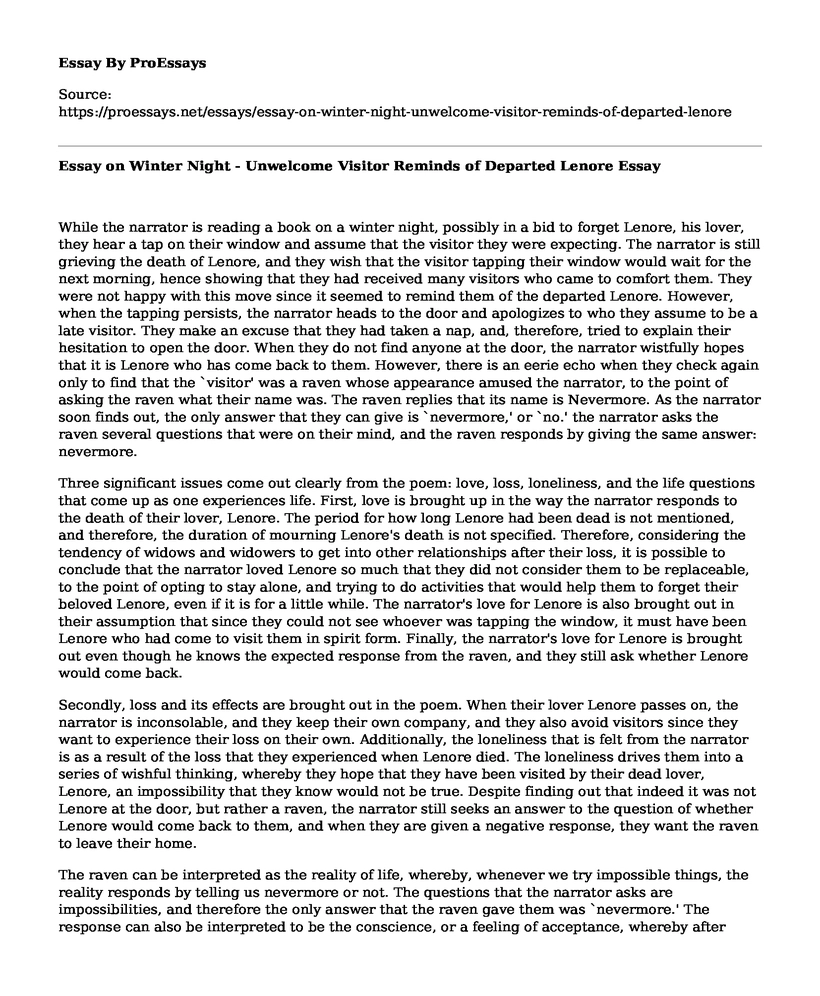While the narrator is reading a book on a winter night, possibly in a bid to forget Lenore, his lover, they hear a tap on their window and assume that the visitor they were expecting. The narrator is still grieving the death of Lenore, and they wish that the visitor tapping their window would wait for the next morning, hence showing that they had received many visitors who came to comfort them. They were not happy with this move since it seemed to remind them of the departed Lenore. However, when the tapping persists, the narrator heads to the door and apologizes to who they assume to be a late visitor. They make an excuse that they had taken a nap, and, therefore, tried to explain their hesitation to open the door. When they do not find anyone at the door, the narrator wistfully hopes that it is Lenore who has come back to them. However, there is an eerie echo when they check again only to find that the `visitor' was a raven whose appearance amused the narrator, to the point of asking the raven what their name was. The raven replies that its name is Nevermore. As the narrator soon finds out, the only answer that they can give is `nevermore,' or `no.' the narrator asks the raven several questions that were on their mind, and the raven responds by giving the same answer: nevermore.
Three significant issues come out clearly from the poem: love, loss, loneliness, and the life questions that come up as one experiences life. First, love is brought up in the way the narrator responds to the death of their lover, Lenore. The period for how long Lenore had been dead is not mentioned, and therefore, the duration of mourning Lenore's death is not specified. Therefore, considering the tendency of widows and widowers to get into other relationships after their loss, it is possible to conclude that the narrator loved Lenore so much that they did not consider them to be replaceable, to the point of opting to stay alone, and trying to do activities that would help them to forget their beloved Lenore, even if it is for a little while. The narrator's love for Lenore is also brought out in their assumption that since they could not see whoever was tapping the window, it must have been Lenore who had come to visit them in spirit form. Finally, the narrator's love for Lenore is brought out even though he knows the expected response from the raven, and they still ask whether Lenore would come back.
Secondly, loss and its effects are brought out in the poem. When their lover Lenore passes on, the narrator is inconsolable, and they keep their own company, and they also avoid visitors since they want to experience their loss on their own. Additionally, the loneliness that is felt from the narrator is as a result of the loss that they experienced when Lenore died. The loneliness drives them into a series of wishful thinking, whereby they hope that they have been visited by their dead lover, Lenore, an impossibility that they know would not be true. Despite finding out that indeed it was not Lenore at the door, but rather a raven, the narrator still seeks an answer to the question of whether Lenore would come back to them, and when they are given a negative response, they want the raven to leave their home.
The raven can be interpreted as the reality of life, whereby, whenever we try impossible things, the reality responds by telling us nevermore or not. The questions that the narrator asks are impossibilities, and therefore the only answer that the raven gave them was `nevermore.' The response can also be interpreted to be the conscience, or a feeling of acceptance, whereby after seeking answers for long, we finally come to terms with the reality of the matter. The anger expressed by the narrator towards the raven can also be interpreted as the denial of reality and how we opt to cast out the reality whenever we face issues that we wish have not been concluded, for example, the loss of a loved one.
Conclusion
The use of a raven as the bearer of the bad news that the narrator is essential to the poem since while the narrator assumes that the raven is a dumb animal and that the sounds that they produce only sound that the raven was taught to create by a human, the raven's timely response tend to answer the fundamental questions that the narrator asks. Therefore, considering that the narrator and the raven did not hold a proper conversation, the raven could symbolize the narrator's soul, and they received the answers to their questions without referring anywhere else. So, in conclusion, I would say that the raven's response was critical in bringing closure to the grieving narrator by assuring the narrator that Lenore was not coming back, and therefore they should move on with their life.
Cite this page
Essay on Winter Night - Unwelcome Visitor Reminds of Departed Lenore. (2023, Aug 08). Retrieved from https://proessays.net/essays/essay-on-winter-night-unwelcome-visitor-reminds-of-departed-lenore
If you are the original author of this essay and no longer wish to have it published on the ProEssays website, please click below to request its removal:
- Literary Essay Example: Review of Adventures of Huckleberry Finn by Mark Twain
- Essay Example: Women Rights in the Play A Doll's House
- Changes in Macbeth's Character Essay
- The Character Analysis of Hector in Homer's Iliad Essay Example
- Essay on the Role of Women in Victorian England as Reflected in Elizabeth Gaskell's Mary Barton
- Essay on Examining the Themes of Mother-Daughter Relationships in The Joy Luck Club
- Exploring Mythology & Liminality: A Study of Ancient Greek & Roman Myths - Essay Sample







